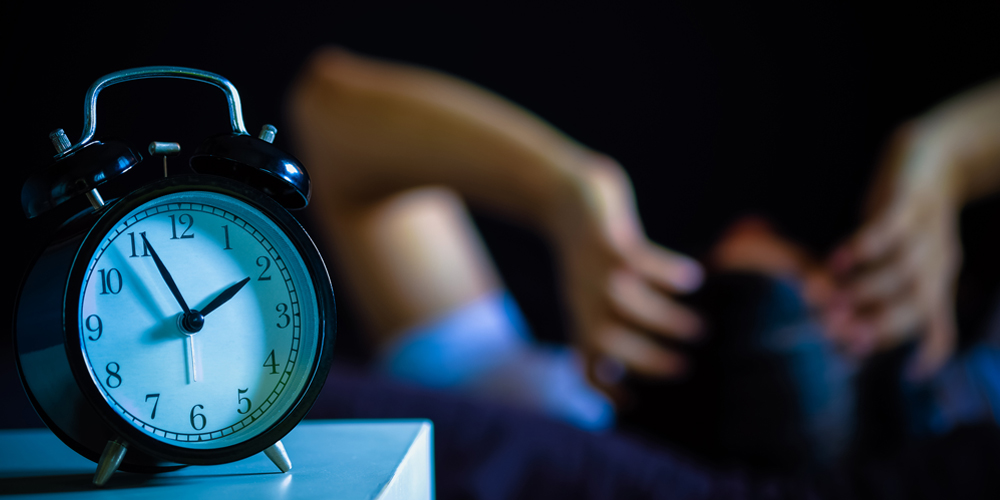How to fight insomnia and its body-depleting effects.

“Please don’t mess with my sleep.”
A warning like this could be helpful as we hear about the increased airplane accidents associated with exhausted pilots or medical errors from sleep-deprived physicians. Unfortunately, today a lot more people are attempting to live on not enough sleep. Twenty percent of teenagers get less than 5 hours of sleep a night, while the average amount is 6.5 hours. It’s not enough.
Forty percent of adults aged 40 to 59 reported getting less than recommended amounts of sleep. Young adults probably top the sleepless charts. Nightlife, work, homework, phones, and computers all bear some responsibility for the lack of time we spend unconscious. At the same time, many people want to sleep more, but they just can’t for various reasons.
How Insomnia Depletes the Body
Insomnia is a sleep disorder characterized by difficulty in falling asleep, staying asleep, or having a restorative sleep. Lack of sleep affects brain function and decision-making. Feelings of despair, depression, stress, and anxiety are all heightened with sleep deprivation. Inflammation is promoted by insufficient sleep as well. Hormone dysregulation can be a factor associated with insomnia, as sleep is hormonally regulated.
Cortisol is one such messenger chemical. It’s made in the adrenal glands and is involved in sleep regulation. Interestingly, most cells have cortisol receptors, meaning cortisol can communicate with and affect many body functions. Cortisol has a natural waxing and waning rhythm.
Typically, cortisol concentration is lowest near midnight. Its peak in the morning is called the cortical awakening response (CAR). The CAR tells the body it’s time to be alert and awake. It also signals immune cells to destroy other immune cells that have autoimmune tendencies. Then, through the day, there’s a progressive decline of cortisol, leading to sleep. However, when cortisol is elevated at the wrong times, sleep deprivation can result, since cortisol signals alertness.
Not only do hormones play their part in regulating our sleep-wake cycle, but the release of nearly every hormone is affected by the circadian rhythm and sleep-wake cycles.
When things are off, a vicious cycle can form. For example, elevated cortisol levels can lead to reduced sleep, and reduced sleep can lead to altered cortisol levels. Altered cortisol has other physiological consequences. In the presence of insulin, cortisol promotes triglyceride accumulation, which can be stored mainly as abdominal fat. Obesity, metabolic syndrome, and type-2 diabetes are linked with altered stress hormone levels and decreased sleep time.
Cortisol is considered a stress hormone and often not looked on too highly. However, it is something you don’t want too much of, or too little, for a variety of reasons. While elevated evening cortisol levels can make falling asleep challenging, inadequate cortisol levels can hinder one from staying asleep. Cortisol also influences immune function, as mentioned. By improving CAR, one can achieve an enhanced immune system balance.
Lack of Sleep, Increased Appetite, and Light
Other hormones affect sleep quality and are simultaneously impacted by sleep. Some of these regulate appetite. Young men subjected to sleep deprivation for two consecutive nights (four hours in bed) experienced a 28-percent increase in ghrelin and an 18-percent reduction in leptin during the day. Ghrelin is an appetite-stimulating hormone, and its increase led to increased hunger and appetite for starchy, sweet, and salty foods. Reduced leptin has also been connected with reduced insulin sensitivity.These are additional contributors to encouraging obesity and type-2 diabetes.
Light entering the retina is the largest contributor not only to sight but also to setting our biological clock. This clock regulates sleep-wake rhythms, body temperature, hormone production, and alertness.
“If humans are not exposed to a sufficient amount of light of the right spectrum, for a sufficient amount of time, and with the right timing, the biological clock becomes desynchronized with the solar day, and humans may experience decrements in physiological functions, neurobehavioral performance, and sleep.”
A small study conducted with sleep-deprived teenagers used short-wavelength blue light. After having only 4.5 hours of sleep at night, they were exposed to bright light. The researchers observed that “exposure to short-wavelength light in the morning significantly enhanced CAR compared to dim light.”
For those who live where the sun doesn’t shine brightly or consistently enough in the morning, lightboxes might be an option. Typically, a 10,000-lux full-spectrum light or a blue light treatment for 30 minutes is recommended, while sitting approximately 16 inches from the lightbox. It may take some days before the impact on circadian rhythms is detectable. Reducing nighttime blue-light waves from TV, phones, and computer screens can also be helpful.
Regulating and Managing Our Body Rhythms
The movement of one hormone can influence another. Elevated levels of insulin in the blood, for instance, affects cortisol production and vice versa. Higher fasting and overnight serum cortisol levels have been associated with insulin resistance, elevated fasting blood sugar, and diabetes. In a roundabout way, improving insulin resistance with diet and exercise could also impact sleep quality.
Stress is a sleep killer. We all know that. “Repeated acute stresses lead to … increased cortisol secretion and loss of … cortisol rhythm.” Stress is often a contributing factor in abdominal weight gain, insulin resistance, elevated blood sugar levels, and poor sleep. Stress exerts its influence on body functions through stress hormones such as — you guessed it — cortisol. My favorite techniques for stress management are exercise, deep breathing, a loving friend, and prayer.
The Bible advises us to “keep sound wisdom and discretion,” because “they will be life to your soul.” And then it adds, “When you lie down, you will not be afraid; yes, you will lie down and your sleep will be sweet” (Proverbs 3:21, 22, 24, NKJV).
Regularity and rhythm are central to the operations of the body. Living in harmony with its rhythms will result in alignment and hopefully improved sleep.
The original version of this article was posted on the Lightbearers articles page.
THIS ARTICLE DOES NOT PROVIDE MEDICAL ADVICE. It is intended for general informational purposes only and does not address individual circumstances. It is not a substitute for professional medical care, counsel, diagnosis or treatment, and it in no way replaces professional medical advice. Please note: Persistent alterations in cortisol levels may indicate underlying disease of the pituitary and or adrenal glands so a medical consultation would be prudent.
—
1. Camila Hirotsu et al., “Interactions Between Sleep, Stress, and Metabolism: From Physiological to Pathological Conditions,” Sleep Science 8, no. 3 (2015), doi: 10.1016/j.slsci.2015.09.002.
2. Hirotsu et al., “Interactions Between Sleep, Stress, and Metabolism.”
3. Mariana G. Figueiro and Mark S. Rea, “Short-Wavelength Light Enhances Cortisol Awakening Response in Sleep-Restricted Adolescents,” International Journal of Endocrinology 2012, Article ID 301935, https://doi.org/10.1155/2012/301935.
4. Mariana G. Figueiro, “Light, Sleep and Circadian Rhythms in Older Adults With Alzheimer’s Disease and Related Dementias,” Neurodegenerative Disease Management 7, no. 2 (2017): 119-145, DOI: 10.2217/nmt-2016-0060.
5. Joshua J. Joseph et al., “Diurnal Salivary Cortisol, Glycemia, and Insulin Resistance: The Multi-ethnic Study of Atherosclerosis,” Psychoneuroendocrinology, 62 (2015): 327-335, https://doi.org/10.1016/j.psyneuen.2015.08.021.
6. Joseph et al., “Diurnal Salivary Cortisol, Glycemia, and Insulin Resistance.”








